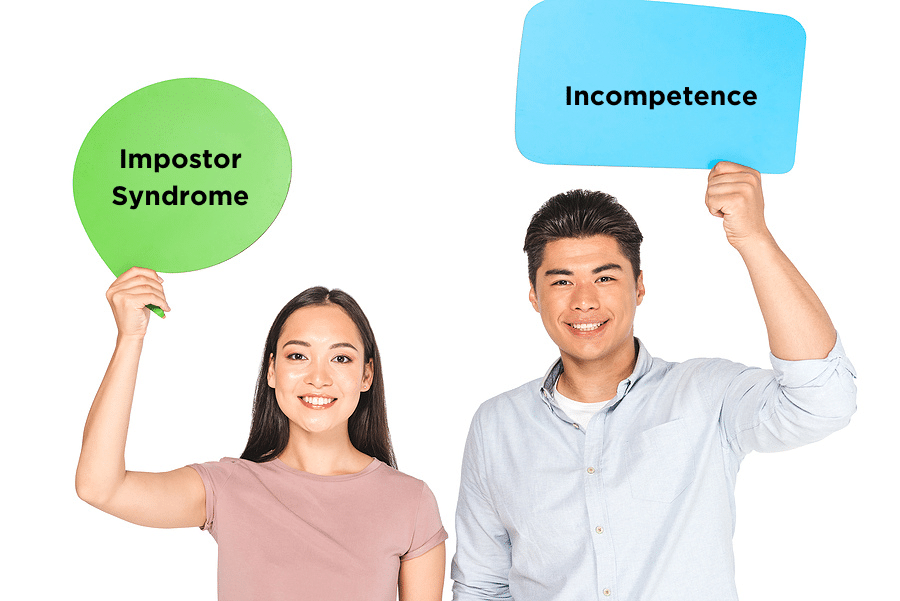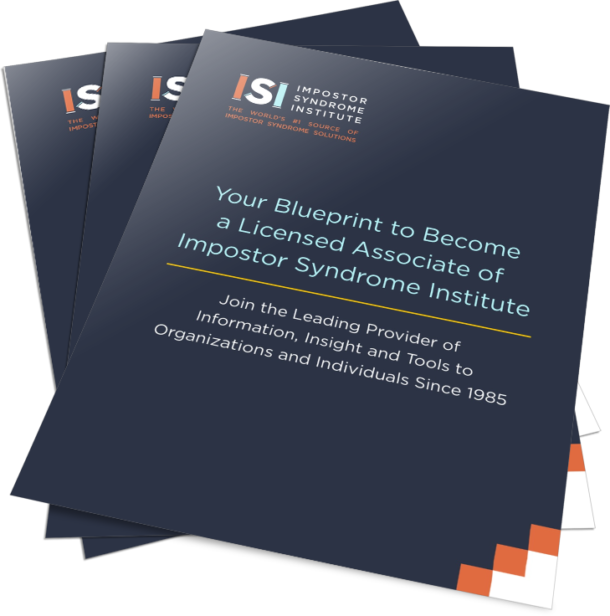Impostor syndrome describes the tendency to dismiss evidence of our accomplishments.
To believe instead that we’ve fooled others into thinking we’re more intelligent or capable than we “know” ourselves to be and that it’s just a matter of time before we’re found out.
But what’s the opposite of impostor syndrome?
In Valerie Young’s 2017 TED Talk she referred to people who don’t experience impostor syndrome simply as “non-impostors.”
Even then, she knew the term was not ideal because people with impostor feelings might interpret it to mean that “non-impostors” are the competent ones.
As imperfect as the term is, it beats the alternative of positioning impostor syndrome’s opposite as one of two undesirable characteristics.
Incompetence

People who feel like inept impostors do so despite evidence — sometimes overwhelming, compelling evidence — of their actual accomplishments and abilities.
So it’s easy to assume that people who’ve never had impostor feelings are incompetent frauds.
This is why many point to the Dunning-Kruger effect, based on the work of social psychologists David Dunning and Justin Kruger, then at Cornell University.
Their 1999 study showed that those who performed the least well at certain tasks significantly overestimated how good they were at these tasks.
A form of what psychologists call “illusionary superiority,” the Dunning-Kruger effect is a cognitive bias whereby people with low skills in a particular domain overestimate their abilities.
However, the term is often misused as an example of general overconfidence on the part of people with low intelligence.
The fact is that the Dunning-Kruger effect describes overconfidence specific to a particular task.

This misunderstanding has resulted in it being frequently cited as impostor syndrome’s polar opposite.
That said, we’ve all met, or worse, perhaps worked with, the perpetually over-confident.
I don’t mean the confidence that inspires others to do better. I mean the proverbial (and annoyingly arrogant) “smartest guy in the room.”
At one end of the confidence continuum is impostor syndrome — capable people (like you) who have every reason to feel confident, but don’t.
On the other end is a lesser-known but arguably more dangerous condition known as irrational self-confidence syndrome (ISC) – a wonderfully apt term coined by former Rocky Mountain News reporter Erica Heath to describe someone who is unjustifiably confident.
Heath writes, “Big talk and supreme self-confidence have landed many jobs in fields such as sales, marketing, and elected office. Once he’s on the inside, the ISC patient can be difficult to spot if he plays the game right.”
Arrogance
Not all supremely confident people are inept or reckless.
Some really can back it up with results.
Take, for instance, characters Harvey Spector or Jessica Pearson on the American TV series Suits.
Or exemplified in real life, Apple co-founder Steve Jobs, businesswoman Barbara Corcoran, or tennis phenomenon Serena Williams.

Indeed, many take heightened displays of confidence as a sign of strength.
However, when taken to the extreme, plenty of others find the perpetually pompous to be a huge turn-off.
Especially when there’s a clear gap between someone’s confidence and their unimpressive performance.
This reality that inspired women attorneys in one firm to invoke the prayer, “Lord, grant me the confidence of a mediocre man.”
Unintended Consequences
There are of course people with far more confidence than competence who in no way identify with impostor syndrome.
At the same time, framing the opposite of impostor syndrome as either ineptitude or self-importance is problematic because it leads to the kind of concerning conclusion conveyed in a widely read 2023 article in The New Yorker.
In it, writer Leslie Jamison wondered if, “Perhaps the widespread practice of confessing self-doubt has begun to encourage—to demand, even—repeated confessions of the very experience that the original concept was trying to dissolve.”
She shared the story of writer and comedian Viv Groskop asking an audience of 500 hundred women to raise their hands if they’d experienced impostor syndrome.

Then Groskop asks who had never experienced it and Jamison writes, “only one (brave) woman did. But, at the end of the talk, this outlier came up to apologize — worried that it was somehow arrogant not to have impostor syndrome.”
This response is unsurprising. But not because of any confession epidemic.
The more likely reason is precisely because the opposite of impostor syndrome is positioned as egoism.
Given the alternative, who wouldn’t apologize?
A False Choice
These two narratives have led us to believe there are only two choices.
- You can keep your impostor syndrome OR
- You can be a self-important, ignorant jerk.
At Impostor Syndrome Institute we consider that to be a false choice.
We see a third – and far healthier – choice.

The choice to unlearn impostor syndrome by learning to think like someone who is genuinely humble, but who, like the sole woman in Groskop’s audience, has never felt like a fraud.
A person we refer to as a Humble Realist.™
Fortunately, humble realist thinking can be learned – and it can be supported in organizations.
In future issues of ISI Insights, you’ll learn more about what it takes to become a humble realist.



